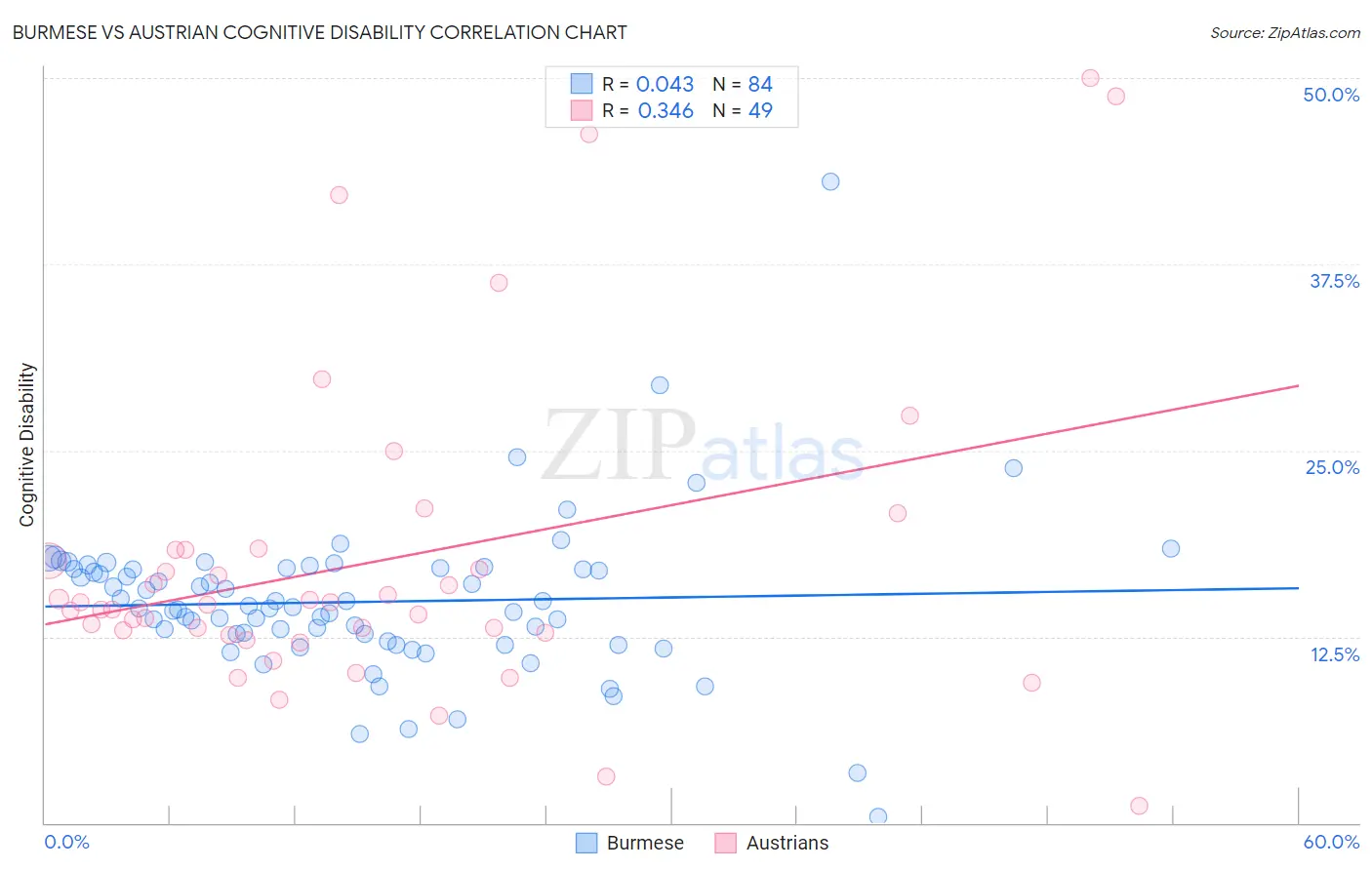Burmese vs Austrian Cognitive Disability
COMPARE
Burmese
Austrian
Cognitive Disability
Cognitive Disability Comparison
Burmese
Austrians
16.7%
COGNITIVE DISABILITY
99.3/ 100
METRIC RATING
73rd/ 347
METRIC RANK
16.6%
COGNITIVE DISABILITY
99.7/ 100
METRIC RATING
56th/ 347
METRIC RANK
Burmese vs Austrian Cognitive Disability Correlation Chart
The statistical analysis conducted on geographies consisting of 465,327,059 people shows no correlation between the proportion of Burmese and percentage of population with cognitive disability in the United States with a correlation coefficient (R) of 0.043 and weighted average of 16.7%. Similarly, the statistical analysis conducted on geographies consisting of 452,054,374 people shows a mild positive correlation between the proportion of Austrians and percentage of population with cognitive disability in the United States with a correlation coefficient (R) of 0.346 and weighted average of 16.6%, a difference of 0.61%.

Cognitive Disability Correlation Summary
| Measurement | Burmese | Austrian |
| Minimum | 0.40% | 1.2% |
| Maximum | 43.0% | 50.0% |
| Range | 42.6% | 48.8% |
| Mean | 14.8% | 17.6% |
| Median | 14.4% | 14.6% |
| Interquartile 25% (IQ1) | 12.4% | 12.7% |
| Interquartile 75% (IQ3) | 17.1% | 18.3% |
| Interquartile Range (IQR) | 4.7% | 5.6% |
| Standard Deviation (Sample) | 5.3% | 10.6% |
| Standard Deviation (Population) | 5.3% | 10.5% |
Demographics Similar to Burmese and Austrians by Cognitive Disability
In terms of cognitive disability, the demographic groups most similar to Burmese are Slavic (16.7%, a difference of 0.0%), German (16.7%, a difference of 0.010%), Immigrants from Belgium (16.7%, a difference of 0.020%), Immigrants from Sweden (16.7%, a difference of 0.030%), and Immigrants from Uzbekistan (16.7%, a difference of 0.040%). Similarly, the demographic groups most similar to Austrians are Bhutanese (16.6%, a difference of 0.010%), Pennsylvania German (16.6%, a difference of 0.080%), Immigrants from Peru (16.6%, a difference of 0.080%), Immigrants from Venezuela (16.5%, a difference of 0.090%), and Romanian (16.6%, a difference of 0.090%).
| Demographics | Rating | Rank | Cognitive Disability |
| Immigrants | Iran | 99.8 /100 | #54 | Exceptional 16.5% |
| Immigrants | Venezuela | 99.7 /100 | #55 | Exceptional 16.5% |
| Austrians | 99.7 /100 | #56 | Exceptional 16.6% |
| Bhutanese | 99.7 /100 | #57 | Exceptional 16.6% |
| Pennsylvania Germans | 99.7 /100 | #58 | Exceptional 16.6% |
| Immigrants | Peru | 99.7 /100 | #59 | Exceptional 16.6% |
| Romanians | 99.7 /100 | #60 | Exceptional 16.6% |
| Immigrants | England | 99.6 /100 | #61 | Exceptional 16.6% |
| Czechoslovakians | 99.6 /100 | #62 | Exceptional 16.6% |
| Argentineans | 99.6 /100 | #63 | Exceptional 16.6% |
| Venezuelans | 99.6 /100 | #64 | Exceptional 16.6% |
| Colombians | 99.6 /100 | #65 | Exceptional 16.6% |
| Immigrants | Ukraine | 99.5 /100 | #66 | Exceptional 16.6% |
| Latvians | 99.5 /100 | #67 | Exceptional 16.6% |
| Ukrainians | 99.4 /100 | #68 | Exceptional 16.6% |
| Immigrants | Uzbekistan | 99.4 /100 | #69 | Exceptional 16.7% |
| Immigrants | Sweden | 99.4 /100 | #70 | Exceptional 16.7% |
| Immigrants | Belgium | 99.3 /100 | #71 | Exceptional 16.7% |
| Germans | 99.3 /100 | #72 | Exceptional 16.7% |
| Burmese | 99.3 /100 | #73 | Exceptional 16.7% |
| Slavs | 99.3 /100 | #74 | Exceptional 16.7% |